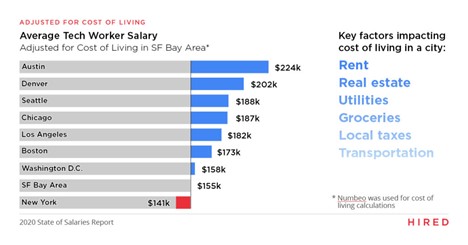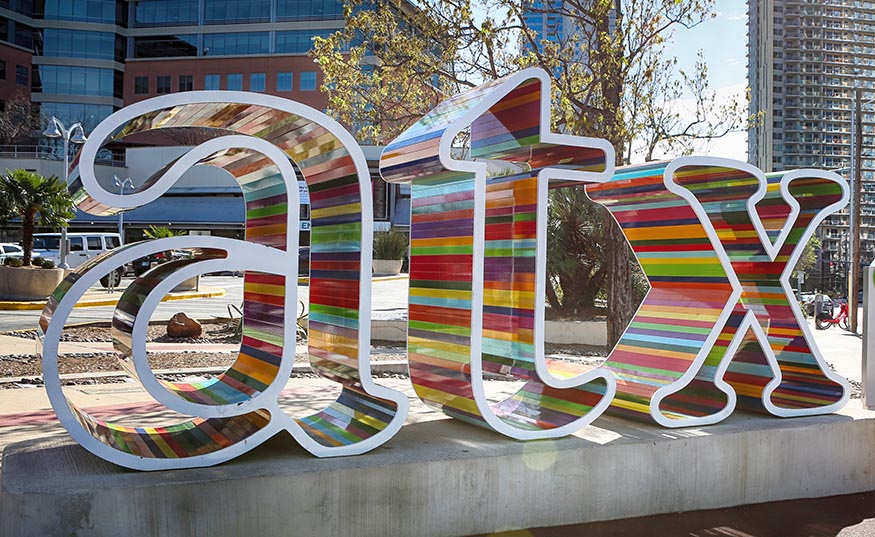Welcome to Austin! Good luck fighting for talent. That’s the unfortunate message Austin employers—both established companies and newcomers alike—are hearing right now. The good news is that Austin is a terrific market for talent. You might just need to go about it in ways you didn’t expect.
“Whatever perceptions you had about hiring Austin talent even months ago needs to be refreshed. Whether your company is new to the state or city or you’re well-seasoned in recruiting Austin talent, the game has changed on both fronts,” says Dave Benjamin, Executive Search Practice Director at The HT Group.
To illustrate that point, we’ll let you in on a few secrets:
Salary And Compensation Expectations Have Changed Significantly
The wage growth in the Austin area consistently outpaces the national average by 2-3% every quarter. Austin tech workers command the highest salaries. In fact, Austin has had the highest growth in U.S. tech salaries in 2019, with a 10% annual increase. Adjusted for cost-of-living, Austin tech workers pocket at least $100,000 more discretionary income than those living in the Bay Area or New York. But don’t be fooled: That doesn’t mean you can pay them a reduced rate.

“That’s the key point. Don’t expect to pinch pennies when hiring in Austin over a place like Silicon Valley. Your compensation package needs to be nationally competitive to be attractive,” says Paul McGaughan, Practice Director for The HT Group Technical Recruiting.
The benefits you provide matter as well. We recently reported on the evolving expectations job seekers have when it comes to perks. Mental health support has never been more critical, as are more PTO, continued remote work options, financial tools, and more.
Your Physical Location Makes A Difference
If you expect your workers to clock in at the office at least part of the time, your location matters. Scoring a swanky location in downtown Austin or near your executives west of downtown was once ideal. But with traffic rebounding from the pandemic, shelling out the budget on a site that’s 30 minutes or more for most of your workers to reach may not score you points. Facebook has reportedly gotten cold feet about significantly increasing its downtown footprint while Apple, Oracle, Tesla, IBM, AMD, Dell and other large employers are scattered throughout the region.
And while traffic is an issue, the housing market is pushing more and more residents to the far suburbs.
“Right now homes, from what we’re hearing because we’re moving our people here, are selling for between 30-40% over asking, within the first two days that they’re on market,” says Hany Fam, founder and CEO of Markaaz, a tech startup that recently relocated to Austin from California.
Before landing on a location in Austin, it might be worth talking to a residential real estate professional about housing and commuting considerations. And if you’re already in Austin and think you have it all figured out, note that major construction planned for I-35, changes to Capital Metro routes, and a continued increase in population will dramatically affect commute times for up to 10 years.
Your Work Culture Needs To Be Attractive
More than half of the job seekers in a Glassdoor survey said that company culture is more important than salary when it comes to job satisfaction. Over 77% would consider a company’s culture before even applying for a job there. With the stakes ever rising in the Austin job market, organizations with poor work cultures are the first to be left behind. Be sure to:
- Fix unclear core values. How do you expect to hire great culture fits when A) you don’t understand your culture to begin with and B) you don’t share those principles openly? Feel free to use our own journey in understanding and sharing our core values as a learning tool.
- Walk the talk. About 65% of a group of large companies MIT Sloan studied listed “integrity” in their corporate values, and 53% listed “collaboration.” If you asked their employees, how many would say that integrity and collaboration were, indeed, values they witnessed daily? Not nearly as many, for sure. Austin job seekers are savvy. They’ll work their networks and seek out online reviews to find out the truth behind claimed values, often before stepping into an interview.
- Understand the difference between sameness and shared values. A misunderstanding can result in a workplace that is devoid of diversity. In short, your efforts to hire what you think are cultural fits could be resulting in unconscious bias. You could also fall into the trap of looking for job candidates who fit the mold already instead of those who can adapt (since your culture is sure to change over time).
While jobs have been increasing again in many Austin industries, we’ve seen job applicants decrease by 75% or more. Giving your compensation packages, location requirements, and work culture a facelift is essential. You’ll also want to consider your staffing and recruiting strategies, perhaps changing what you’ve done in the past to attract more passive job seekers. Whether you’re an Austin newcomer or have been employing Austinites for a long time, the playing field is new and deserves a fresh game plan.




